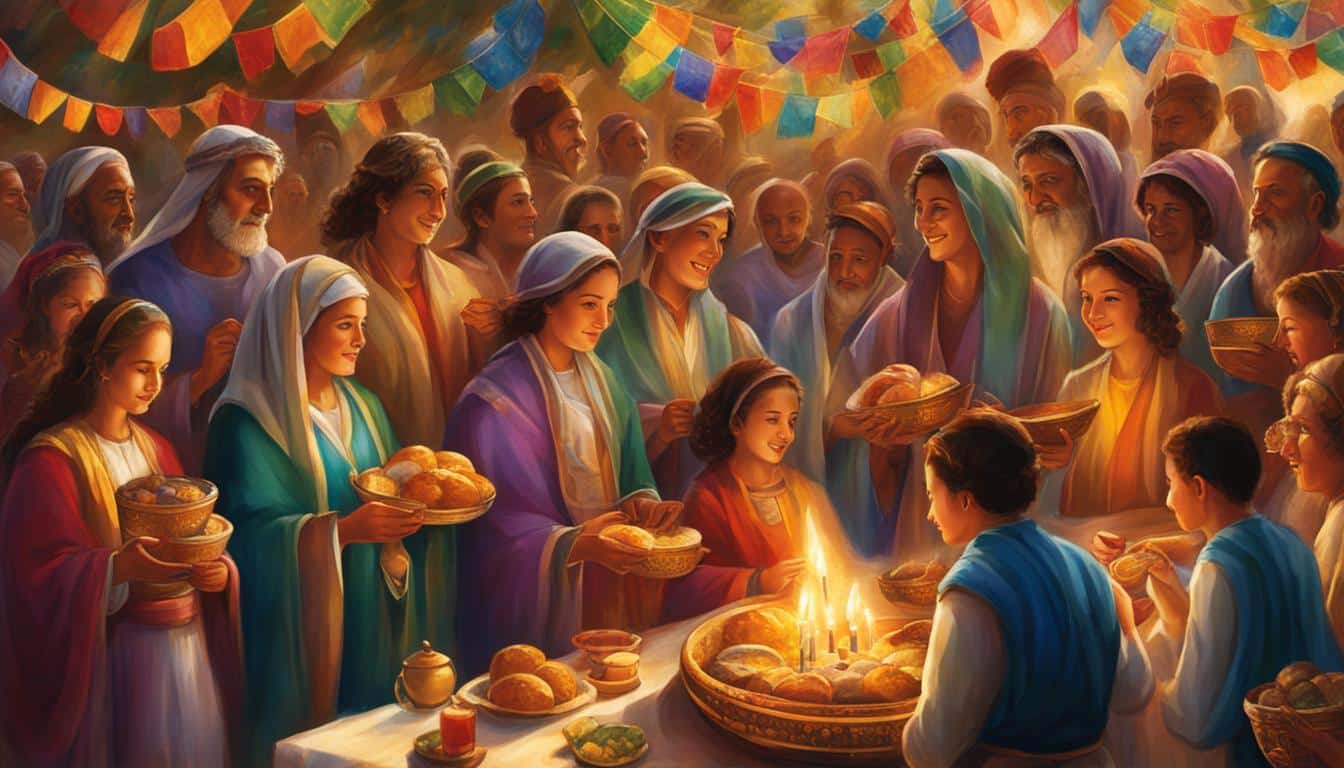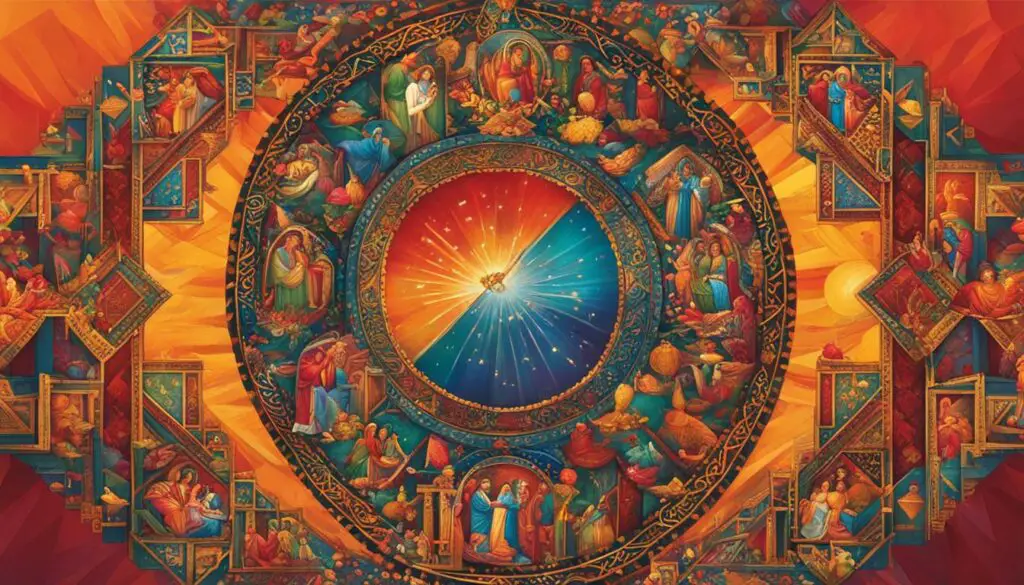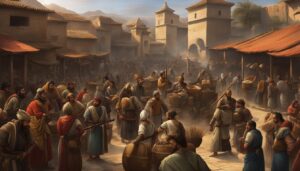
The biblical festivals and holidays hold great importance in religious and spiritual traditions. These sacred observances have been celebrated by the Jewish people for centuries, established by God Himself as a way to commemorate historical events and honor His faithfulness. Understanding the significance of these festivals can deepen our understanding of God’s character and His redemptive plan.
Key Takeaways:
- The biblical festivals are known as the “Feasts of the Lord” and are considered holy convocations.
- There are three major annual feasts: Passover, Shavuot (Pentecost), and Sukkot (Feast of Tabernacles).
- These festivals have both historical and spiritual significance, symbolizing freedom, the giving of the law, and the dwelling of the Israelites in temporary shelters.
- Christian holidays, such as the Last Supper and the outpouring of the Holy Spirit, are associated with the Jewish feasts.
- Christians have the freedom to observe these festivals as a way of deepening their understanding of God’s work in their lives.
The Biblical Feasts and Their Meaning
The biblical feasts hold profound spiritual significance and carry a multitude of meanings. Let’s delve into the significance of each feast and explore their connections to both Jewish and Christian traditions.
Passover
Passover, celebrated in the month of Nissan, commemorates the liberation of the Israelites from slavery in Egypt. It serves as a powerful reminder of God’s faithfulness and His deliverance of His people. In Christian theology, Passover also represents the ultimate sacrifice of Jesus Christ, who became the sacrificial Lamb of God, granting forgiveness and eternal freedom from sin to all who believe in Him.
| Significance | Jewish Tradition | Christian Interpretation |
|---|---|---|
| Freedom from bondage | Remembrance of the Exodus from Egypt | Symbolizes salvation through Jesus’ sacrifice |
| Removing leaven | Literal removal of leaven from homes | Represents the removal of sin through Christ |
Shavuot (Feast of Weeks)
Shavuot, also known as the Feast of Weeks, is a celebration of the giving of the Law to Moses on Mount Sinai. The Jewish tradition also marks this occasion as the time of the harvest. In Christian belief, Shavuot is widely recognized as the day of Pentecost, when the Holy Spirit descended upon the disciples, empowering them to spread the gospel message to the world.
Feast of Tabernacles (Sukkot)
The Feast of Tabernacles, or Sukkot, commemorates the time when the Israelites dwelled in temporary shelters during their journey through the wilderness. It serves as a reminder that our earthly existence is temporary and that we are merely sojourners in this world. In the New Testament, Sukkot alludes to the glorious Second Coming of Christ and the establishment of God’s eternal Kingdom.
“The biblical feasts provide a rich tapestry of symbolism and spiritual depth, offering believers an opportunity to connect with God’s redemptive plan and deepen their faith.”
The biblical feasts are a testament to God’s faithfulness, history, and His divine plan of salvation. While they hold significant spiritual meaning, it is important to approach these traditions with reverence and an understanding that they are not obligatory for Christians. However, by exploring the meaning behind the feasts, Christians can gain deeper insights into God’s character, His redemptive work, and the interconnectedness between the Old and New Testaments.

Should Christians Observe the Biblical Feasts?
The question of whether Christians should observe the biblical feasts is a matter of personal conviction and interpretation of Scripture. While Christians are not bound by the Old Covenant requirements, understanding the biblical festivals can deepen their appreciation for the redemptive work of Jesus and enhance their faith.
Many churches around the world have started celebrating these holidays in recent years. The biblical feasts provide an opportunity to learn more about God’s character, His appointed times, and His desire for us to be mindful of His work in our lives.
However, it is important to note that observing these feasts should not be seen as a requirement for salvation or as a means of earning God’s favor. It is a personal choice and a way to embrace the rich heritage and spiritual significance of these festivals. Ultimately, the decision to observe the biblical feasts should be guided by prayer, studying the Scriptures, and seeking the leading of the Holy Spirit.
FAQ
Why are the biblical festivals significant?
The biblical festivals hold great spiritual significance and serve as a reminder of historical events in the Bible and the faithfulness of God. They also point to Jesus and His redemptive work.
What are the three major annual feasts in the Bible?
The three major annual feasts are Passover, Shavuot (Pentecost), and Sukkot (Feast of Tabernacles).
How are the biblical festivals associated with Christian holidays?
The Last Supper, which took place during Passover, is associated with the Christian holiday of Easter. The outpouring of the Holy Spirit on Pentecost is also connected to the Jewish festival of Shavuot.
How are the biblical feasts determined?
The dates of the biblical festivals are determined by the Hebrew calendar, which follows a lunar system.
Should Christians observe the biblical feasts?
The observance of the biblical feasts is a personal choice and a matter of personal conviction and interpretation of Scripture. While Christians are not bound by the Old Covenant requirements, celebrating these festivals can deepen their understanding of God’s work and enhance their faith.








